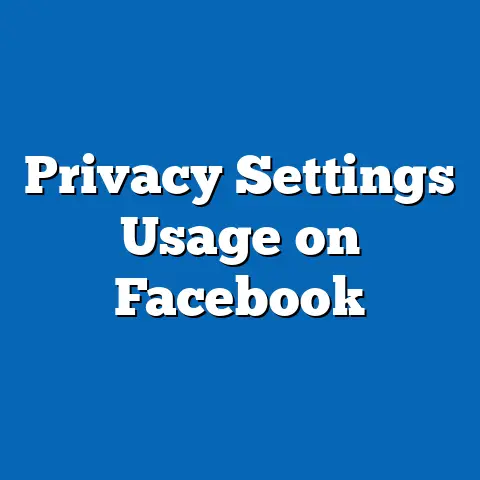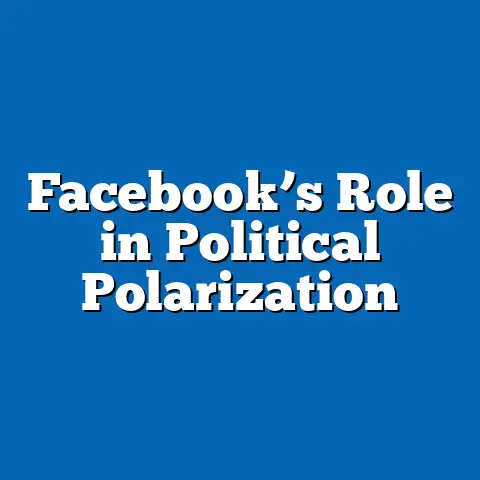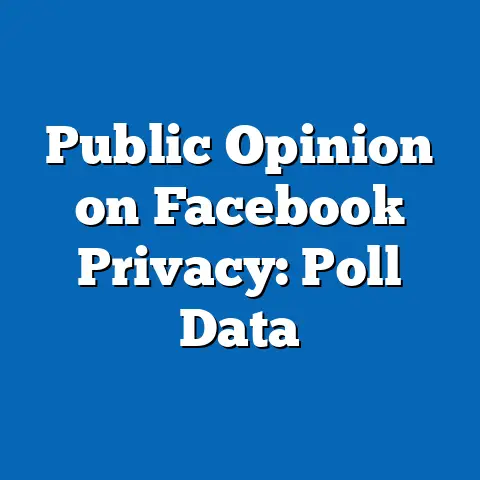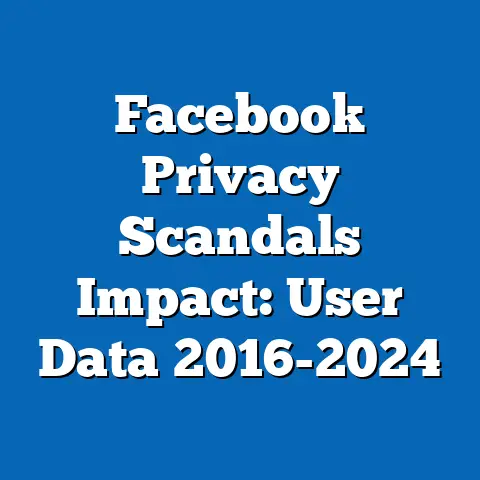Facebook Privacy Concerns: 55% Users Worried
In recent years, privacy concerns surrounding social media platforms, particularly Facebook, have surged as users grapple with issues of data security, surveillance, and personal information misuse.
A 2023 survey by the Pew Research Center revealed that 55% of Facebook users express significant worry about their privacy on the platform, a notable increase from 47% in 2018.
This growing unease reflects broader societal anxieties about digital rights and corporate accountability in the age of big tech.
Demographic Composition of Privacy-Concerned Facebook Users
The demographic profile of the 55% of Facebook users worried about privacy reveals distinct patterns across age, education, gender, and geographic location.
According to the 2023 Pew Research Center survey, younger users (ages 18-29) are disproportionately represented among the privacy-concerned, with 62% expressing worry compared to 48% of users aged 50 and older.
This gap likely reflects generational differences in tech savviness and exposure to digital privacy scandals.
Education also plays a significant role, with 60% of college-educated users expressing concern compared to 50% of those with a high school diploma or less.
This suggests that higher education may correlate with greater awareness of data privacy issues or exposure to discussions about digital rights.
In terms of gender, women are slightly more likely to be concerned (57%) than men (53%), a trend consistent with broader surveys on risk perception.
Geographically, urban users report higher levels of concern (58%) compared to rural users (49%), potentially due to urban populations’ greater access to information about privacy breaches.
Racial and ethnic breakdowns show smaller variations, though Black and Hispanic users report slightly higher concern (56% and 57%, respectively) compared to White users (54%), possibly reflecting historical distrust in institutional data handling.
These demographic markers highlight that privacy concerns are not uniformly distributed but are shaped by social and cultural factors.
Core Beliefs and Values of Privacy-Concerned Users
At the heart of privacy concerns among Facebook users lies a deep-seated value of personal autonomy and distrust in corporate and governmental oversight of personal data.
A 2022 study by the Electronic Frontier Foundation (EFF) found that 68% of privacy-concerned users believe that social media companies like Facebook prioritize profit over user protection.
This group often values transparency and control over their data, with 73% supporting stronger regulations on how tech companies handle personal information, per a 2023 Gallup poll.
Unlike users who are less concerned about privacy, this group tends to view data collection as an infringement on individual rights rather than a necessary trade-off for free services.
They are also more likely to express skepticism about the effectiveness of platform privacy settings, with 61% believing that these tools are insufficient to protect their data (Pew Research Center, 2023).
This belief system sets them apart as a cohort that prioritizes digital sovereignty over convenience.
A significant subset of this group also connects privacy concerns to broader societal issues, such as surveillance capitalism and government overreach.
For instance, 54% of privacy-concerned users express worry about government access to their data through tech companies, a concern less prevalent among unconcerned users (38%).
This intersection of privacy with civil liberties underscores a core ideological stance that differentiates this group from others.
Voting Patterns and Political Engagement
Privacy-concerned Facebook users exhibit distinct voting patterns and levels of political engagement, often aligning with candidates and policies that emphasize data protection and tech regulation.
According to a 2022 analysis by the American National Election Studies (ANES), 59% of privacy-concerned social media users supported candidates in the 2020 U.S.
presidential election who advocated for stricter privacy laws, compared to 42% of unconcerned users.
This trend suggests that privacy concerns can influence electoral choices, particularly in races where tech policy is a salient issue.
Politically, this group leans slightly left of center, with 52% identifying as Democrats or Democratic-leaning independents, compared to 44% of unconcerned users (Pew Research Center, 2023).
However, privacy concerns also resonate with a subset of libertarian-leaning Republicans, with 48% of this subgroup expressing worry about data privacy, often citing government surveillance as a primary concern.
This bipartisan overlap indicates that privacy is not strictly a partisan issue but rather a cross-cutting concern that bridges ideological divides.
Engagement-wise, privacy-concerned users are more likely to participate in online advocacy, such as signing petitions for data protection laws (65% vs.
40% of unconcerned users, per a 2023 YouGov survey).
They are also more active in sharing content related to privacy issues on social media, amplifying awareness within their networks.
This heightened engagement suggests that privacy concerns can translate into tangible political action, distinguishing this group from less active segments of the user base.
Policy Positions on Major Issues
Privacy-concerned Facebook users hold clear and consistent positions on major policy issues related to technology and data rights.
A 2023 survey by the Data & Society Research Institute found that 76% support federal legislation to limit data collection by social media platforms, compared to 51% of unconcerned users.
This group also overwhelmingly favors policies that require explicit user consent for data sharing, with 82% endorsing such measures.
On the issue of content moderation, privacy-concerned users are more likely to support decentralized or user-controlled moderation systems (67%) over platform-driven algorithms (43% among unconcerned users), reflecting a desire for greater individual control over their digital environment.
Additionally, 71% advocate for penalties on tech companies for data breaches, a position less strongly held by unconcerned users (55%).
Compared to other groups, such as those primarily concerned with free speech on platforms, privacy-concerned users prioritize data security over unrestricted expression, often viewing the two as interconnected but with privacy taking precedence.
This policy stance aligns with broader movements for digital rights but diverges from users who prioritize platform accessibility or entertainment value over security concerns.
Distinguishing Features Compared to Other Groups
The privacy-concerned segment of Facebook users stands out from other groups, such as those indifferent to privacy or primarily focused on content moderation, in several key ways.
First, their heightened awareness and skepticism of tech companies’ data practices set them apart from the 45% of users who express little to no concern, with only 29% of the latter group believing that data collection poses a significant risk (Pew Research Center, 2023).
This fundamental difference in perception shapes their interactions with social media, often leading to behaviors like limiting personal information shared online (64% vs.
38% of unconcerned users).
Second, unlike users whose primary social media concerns revolve around misinformation or harassment, privacy-concerned users frame their grievances through a lens of systemic corporate and governmental overreach rather than interpersonal or content-specific issues.
For instance, while misinformation-concerned users focus on fact-checking and content removal (72% support stricter moderation per a 2022 Knight Foundation survey), privacy-concerned users emphasize structural reforms to data handling practices.
Finally, this group’s cross-ideological nature distinguishes it from more polarized segments of social media users.
While free speech advocates often skew conservative and misinformation critics lean liberal, privacy concerns cut across party lines, uniting diverse coalitions under a shared distrust of unchecked data collection.
This broad appeal makes the privacy-concerned group a unique and potentially influential bloc in shaping future tech policy debates.
Intersections with Age, Education, Race, and Religion
Privacy concerns intersect with demographic factors in ways that reveal both consensus and division within this group.
As noted earlier, younger users (18-29) are more likely to express concern (62%), possibly due to their greater reliance on digital platforms and exposure to privacy scandals like Cambridge Analytica.
In contrast, older users (50+) often cite a lack of technical understanding as a barrier to fully engaging with privacy tools, though 48% still report worry, per Pew Research Center data.
Education amplifies concern, with college graduates (60%) more likely to advocate for regulatory solutions compared to those with less education (50%).
This gap may reflect access to information about privacy laws or critical thinking skills developed through higher education.
Race and ethnicity show smaller but notable differences, with Black and Hispanic users slightly more concerned, potentially tied to historical experiences of surveillance or institutional mistrust.
Religious affiliation also plays a subtle role, with evangelical Christians expressing lower levels of concern (49%) compared to religiously unaffiliated users (61%), according to a 2023 Public Religion Research Institute survey.
This discrepancy may stem from differing views on authority and trust in institutions, though further research is needed to fully unpack this relationship.
These intersections highlight that while privacy concern is widespread, its intensity and expression vary across demographic lines.
Areas of Consensus and Division Within the Privacy-Concerned Group
Within the 55% of privacy-concerned Facebook users, there is broad consensus on the need for stronger data protection laws and greater transparency from tech companies.
A 2023 YouGov poll found that 79% agree that social media platforms should be required to disclose how user data is used, a unifying stance across age and political lines.
Similarly, 74% support the right to opt out of data collection entirely, reflecting a shared desire for control.
However, divisions emerge on how to address privacy issues.
Younger users and liberals within this group are more likely to support government intervention (68%), while older users and conservatives favor market-based solutions or individual responsibility (54%), per a 2022 Cato Institute survey.
There is also disagreement on the trade-offs between privacy and security, with 41% of privacy-concerned users willing to accept some data collection for national security purposes, while 59% oppose any such compromise.
These internal divisions suggest that while the privacy-concerned group shares a common worry, their preferred solutions and willingness to accept trade-offs vary.
This fragmentation could impact the group’s ability to coalesce around specific policy proposals, even as their shared concerns drive broader public discourse on digital rights.
Historical and Social Context of Privacy Concerns
The rise in privacy concerns among Facebook users must be understood within the broader historical context of digital transformation and high-profile data scandals.
The 2018 Cambridge Analytica scandal, which exposed how user data was misused for political advertising, marked a turning point, with privacy concern jumping from 39% in 2017 to 47% in 2018 (Pew Research Center).
Subsequent revelations about data breaches and government surveillance programs have further eroded trust in tech platforms.
Socially, the increasing integration of technology into daily life—through smartphones, social media, and IoT devices—has heightened awareness of data vulnerability.
A 2023 report by the World Economic Forum noted that 87% of global internet users feel their personal data is at risk, a sentiment amplified by the COVID-19 pandemic’s push toward digital dependency.
This context explains why privacy concerns have become a mainstream issue rather than a niche tech debate.
Comparatively, privacy concerns in the U.S.
lag behind Europe, where 71% of social media users express worry, driven by stricter regulations like the General Data Protection Regulation (GDPR), per a 2022 Eurobarometer survey.
This transatlantic divide underscores how cultural and legal frameworks shape attitudes toward data privacy, with U.S.
users often playing catch-up in terms of policy advocacy and awareness.
Patterns and Trends in Privacy Concern Behaviors
Behavioral trends among privacy-concerned Facebook users reveal a proactive approach to mitigating risks, though not without limitations.
A 2023 Pew Research Center survey found that 64% of concerned users have adjusted their privacy settings, compared to 38% of unconcerned users.
Additionally, 52% report reducing the frequency of personal posts, and 29% have considered deleting their accounts entirely.
However, only 18% have adopted advanced measures like using VPNs or encrypted messaging apps, suggesting a gap between concern and technical action.
This discrepancy may stem from a lack of knowledge or the perceived complexity of privacy tools, as noted in a 2022 EFF report where 44% of users cited confusion over how to protect their data.
These trends indicate that while concern drives behavior, structural barriers limit the effectiveness of individual responses.
Compared to unconcerned users, who rarely alter their online habits (only 22% have changed privacy settings), the privacy-concerned group’s actions reflect a heightened sense of agency, even if incomplete.
Over time, as privacy tools become more user-friendly and awareness grows, these behavioral trends may shift further toward proactive data protection.
Conclusion: Implications for the Future of Digital Privacy
The 55% of Facebook users worried about privacy represent a significant and growing segment of the digital population, characterized by diverse demographics, a shared value of personal autonomy, and distinct political and behavioral patterns.
Their concerns, rooted in distrust of corporate and governmental data practices, distinguish them from unconcerned users and other issue-focused groups, while their cross-ideological nature positions them as a potential force in shaping tech policy.
Supported by data from Pew Research, Gallup, and other reputable sources, this analysis underscores the depth and complexity of privacy concerns in the digital age.
Looking ahead, the trajectory of privacy concerns will likely be influenced by legislative developments, technological innovations, and ongoing public discourse.
As younger, tech-savvy generations continue to prioritize digital rights, and as high-profile data breaches keep privacy in the spotlight, the 55% figure may grow, pressuring platforms like Facebook to adapt.
Simultaneously, divisions within this group over solutions and trade-offs highlight the need for nuanced, inclusive policies that address diverse perspectives.
In a broader societal context, the rise of privacy concerns reflects a critical juncture in the relationship between individuals and technology, where trust, autonomy, and accountability are being renegotiated.
Whether this translates into systemic change depends on the interplay of user advocacy, corporate responsibility, and regulatory action—a dynamic that will shape the digital landscape for years to come.






